unit do you want to go to movie教学设计及练习题教案
- 格式:docx
- 大小:29.07 KB
- 文档页数:17
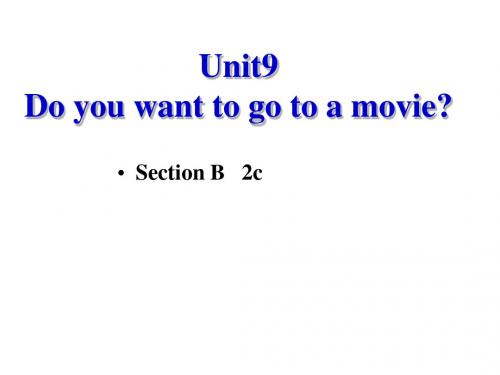
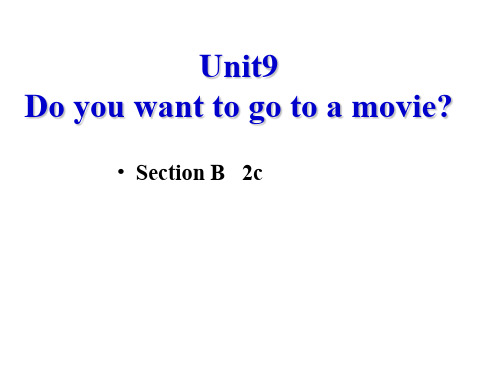

[单词学习]1. movie ['mu:vi]【用法1】n.电影,影片【例句】This movie is worth seeing. 这部影片值得一看。
【用法2】the movies电影院【例句】Let's go to the movies. 咱们去(电影院)看电影吧。
【拓展】看电影的表达方法go to a movie (特指)看场电影go to moviesgo to see a moviego to the cinemago to see a film【拓展】action movie 动作片comedy喜剧片tragedy 悲剧片documentary 纪录片thriller 恐怖片war movie 战争片cartoon 动画电影,动画片【考点】comedy —comediesdocumentary —documentaries2. kind [kaind]【用法1】n. 种类,与of连用时,表“……的种类”。
【拓展】a kind of 一种……all kinds of 各种各样的……different kinds of 不同种类的……【例句】—What kind of fruit do you like? 你喜欢哪种水果?—Apples.苹果。
There are all kinds of cars here. 这儿有各种各样的车。
【用法2】adj. 和蔼的,友好的be kind to sb …对某人好【例句】Our teachers are kind to us. 我们的老师对我们很好。
【考题链接】A: It’s Mary’s birthday. I want to give her a CD. What _____ of music does she like?B: Rock music.A. kindB. kindsD. names答案:A. kind解题思路:这里问的是“哪一种音乐”,所以用kind的单数形式。
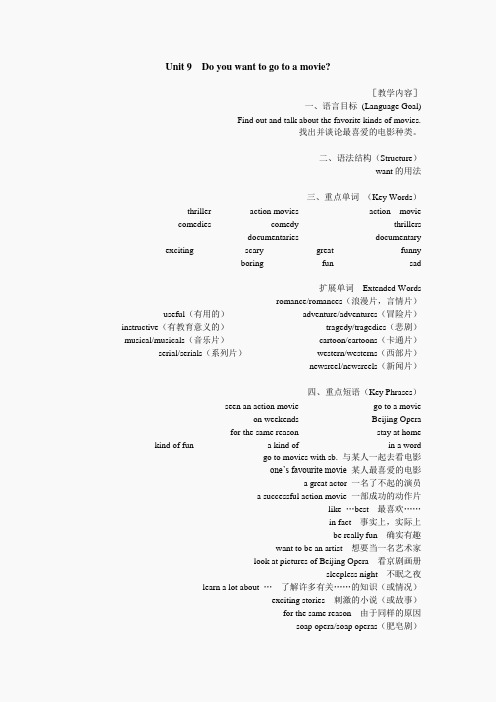
Unit 9 Do you want to go to a movie?[教学内容]一、语言目标(Language Goal)Find out and talk about the favorite kinds of movies.找出并谈论最喜爱的电影种类。
二、语法结构(Structure)want的用法三、重点单词(Key Words)thrilleraction movieaction moviescomedycomediesthrillersdocumentariesdocumentaryscaryexcitinggreatfunnyfunboringsad扩展单词Extended Wordsromance/romances(浪漫片,言情片)useful(有用的)adventure/adventures(冒险片)instructive(有教育意义的)tragedy/tragedies(悲剧)musical/musicals(音乐片)cartoon/cartoons(卡通片)serial/serials(系列片)western/westerns(西部片)newsreel/newsreels(新闻片)四、重点短语(Key Phrases)seen an action moviego to a movieon weekendsBeijing Operafor the same reasonstay at home kind of funa kind ofin a wordgo to movies with sb. 与某人一起去看电影one’s favourite movie 某人最喜爱的电影a great actor 一名了不起的演员a successful action movie 一部成功的动作片like …best 最喜欢……in fact 事实上,实际上be really fun 确实有趣want to be an artist 想要当一名艺术家look at pictures of Beijing Opera 看京剧画册sleepless night 不眠之夜learn a lot about …了解许多有关……的知识(或情况)exciting stories 刺激的小说(或故事)for the same reason 由于同样的原因soap opera/soap operas(肥皂剧)detective film/detective films (侦探片)五、重点句型(Key Sentence Structures)A. Do you want to go to a movie?Yes, I do./No, I don’t.Does he/she want to go to a movie?Yes, he/she does. No, he/she doesn’t.B. What kind of movie do you like?I like…He/She likes…What kind of movie does he/she like?I like A but I don’t like B.C. I like A and B.He/She likes A and B.He/She likes A but he/she doesn’t like B.六、疑难解析(Key Points)1. want to do 想做某事△want想、欲、愿(与wish同义)及物动词want sth. 要某物。
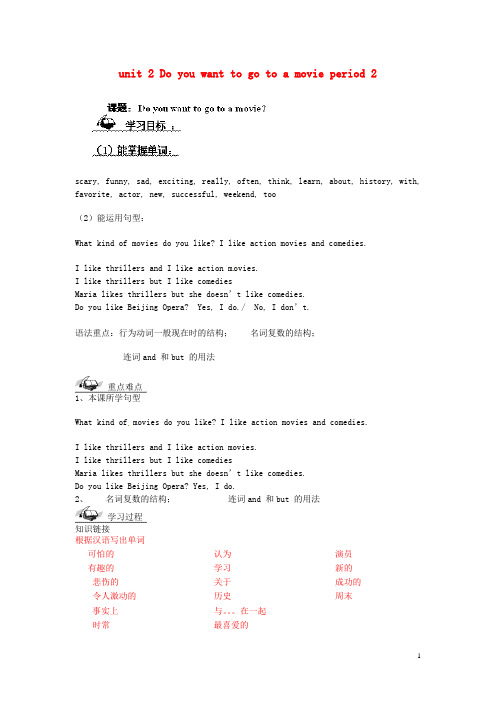
unit 2 Do you want to go to a movie period 2scary, funny, sad, exciting, really, often, think, learn, about, history, with, favorite, actor, new, successful, weekend, too(2)能运用句型:What kind of movies do you like? I like action movies and comedies.I like thrillers and I like action m ovies.I like thrillers but I like comediesMaria likes thrillers but she doesn’t like comedies.Do you like Beijing Opera? Yes, I do./ No, I don’t.语法重点:行为动词一般现在时的结构;名词复数的结构;连词and 和but 的用法What kind of movies do you like? I like action movies and comedies.I like thrillers and I like action movies.I like thrillers but I like comediesMaria likes thrillers but she doesn’t like comedies.Do you like Beijing Opera? Yes, I do.2、名词复数的结构;连词and 和but 的用法知识链接根据汉语写出单词可怕的有趣的悲伤的令人激动的事实上时常认为学习关于历史与。
在一起最喜爱的演员新的成功的周末根据提示填写单词1.I don't like thrillers, because they are s____________ .2. Comedies are f __________ .3.My f__________ movie i s Hero.4. What k___________ of fruit do you like?5. We often play soccer on w___________ .6. __________ (do) she want to go to a movie?7. Marie ______ (like) Beijing Opera very much.8. Many Chinese________ ( like) Beijing Ope ra.9. Rush Hour is a ______ (success) action movie.10. We like ____________ class, because it’s funny. /ˈhɪstərɪ/※自主探究1.你想要什么颜色?_______________________________________2. 你喜欢什么颜色?______________________________________※合作探究以小组为单位,根据上面学过的句子讨论:你喜欢什么电影?___________________________________________________※拓展延伸1 、听力练习 2a, 2bPair work:Lily: Wh at kind of movies do you like, John?John: I like comedies and action movies. What kind of movies do you like? Lily: I like comedies, but I don’t like thrillers.Jane: I like comedies, and I like action movies.3. Write down some sentences like this:John likes comedies and action movies, but he doesn’t like thrillers._______________________________________________________________________________ _______________________________________________________________________________ _____________________________________________三、总结提升※学习小结一)这节课我们学习了下列句型1. 你喜欢什么电影? 我喜欢动作片。
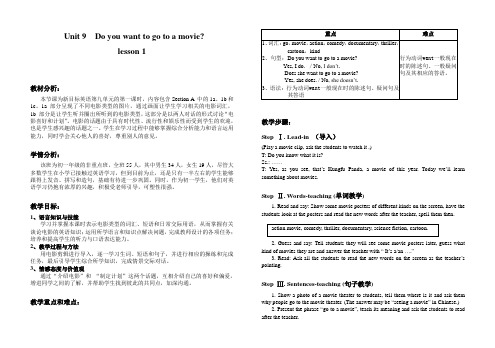
Unit 9 Do you want to go to a movie?lesson 1教材分析:本节课为新目标英语第九单元的第一课时,内容包含Section A 中的1a、1b和1c。
1a 部分呈现了不同电影类型的图片,通过画面让学生学习相关的电影词汇,1b 部分是让学生听并圈出所听到的电影类型,这部分是以两人对话的形式讨论“电影喜好和计划”。
电影的话题由于具有时代性、流行性和娱乐性而受到学生的欢迎,也是学生感兴趣的话题之一。
学生在学习过程中能够掌握综合分析能力和语言运用能力,同时学会关心他人的喜好,尊重别人的意见。
学情分析:该班为初一年级的非重点班,全班55人,其中男生34人,女生19人,尽管大多数学生在小学已接触过英语学习,但到目前为止,还是只有一半左右的学生能够跟得上发音、拼写和造句,基础有待进一步巩固。
同时,作为初一学生,他们对英语学习仍抱有浓厚的兴趣,积极受老师引导,可塑性很强。
教学目标:1、语言知识与技能学习并掌握本课时表示电影类型的词汇、短语和日常交际用语,从而掌握有关谈论电影的英语知识;运用所学语言和知识点解决问题,完成教师设计的各项任务;培养和提高学生的听力与口语表达能力。
2、教学过程与方法用电影剪辑进行导入,逐一学习生词、短语和句子,并进行相应的操练和完成任务,最后引导学生综合所学知识,完成情景交际对话。
3、情感态度与价值观通过“介绍电影”和“制定计划”这两个话题,互相介绍自己的喜好和偏爱,增进同学之间的了解,并帮助学生找到彼此的共同点,加深沟通。
教学重点和难点:教学步骤:Step Ⅰ. Lead-in (导入)(Play a movie clip, ask the students to watch it .)T: Do you know what it is?Ss.: ……T: Yes, as you see, that’s Kungfu Panda, a movie of this year. Today we’ll learn something about movies.Step Ⅱ. Words-teaching (单词教学)1. Read and say: Show some movie posters of different kinds on the screen, have the students look at the posters and read the new words after the teacher, spell them then.action movie, comedy, thriller, documentary, science fiction, cartoon.2. Guess and say: Tell students they will see some movie posters later, guess what kind of movies they are and answer the teacher with “ It’s a/an ….”3. Read: Ask all the students to read the new words on the screen as the teacher’s pointing.Step Ⅲ. Sentences-teaching (句子教学)1. Show a photo of a movie theater to students, tell them where is it and ask them why people go to the movie theater. (The answer may be “seeing a movie” in Chinese.)2. Present the phrase “go to a movie”, teach its meaning and ask the students to read after the teacher.go to a movie=see a movie3. Have the students keep learning the phrases “go to a/an comedy/action movie”and read them in chorus.go to a comedy=see a comedygo to an action movie=see an action movie…4. Let students look the picture of two girls who are talking, tell them the two girls are planning to see a movie, check what they say.Do you want to go to a movie?Yes, I do. / No, I don’t.I want to go to a comedy.5. Divide the students into two groups, have them read the sentences, then ask them if the girl in the picture wants to go to a movie.Does she want to go to a movie?Yes, she does. / No, she doesn’t.She wants to go to a comedy.6. Read the sentences by two groups.Step Ⅳ. Listening (听力训练)1. Show a picture of a boy and a girl who are taking about the movies they want to see, and four kinds of movies next to the picture. Ask the students to match the kinds of movies with the posters in the picture.2. Check their answers: a-action movie; b-thriller; c-comedy; d-documentary.3. Let the students listen to the conversation and check the kinds of movies they hear.4. Check the answers: action movie; comedy.5. Present the conversation on the screen, then ask the students to act it by two groups.Step Ⅴ. Pairwork (结对练习)1. Ask the students if they know any new movies, then present some posters of the new movies on the screen with brief introduction.2. Ask the students to imagine they’re in a movie theater with their friends, make their own conversation .3. Have some pairs come to the front of the classroom to act their conversation.Step Ⅵ. Summary (总结)1. action movie、comedy、documentary、thriller…2. go to a movie = see a movie3. Do you want to go to a movie?Yes, I do. / No, I don’t.I want to go to a comedy.Does she want to go to a movie?Yes, she does. / No, she doesn’t.She wants to see an action movie.。
Unit 9 Do you want to go to a movie?Section A【视野聚焦】1. go to a movie 去看电影2. see a comedy 看喜剧片3. action movie 动作片4. kind of……的种类5. Beijing Opera 京剧1. Do you want to go to a movie? 你想去看电影吗?Yes, I do. I want to see a comedy. 是的,我想去。
我想去看喜剧片。
2. What kind of movies do you like? 你喜欢什么样的电影?I like action movies and comedies. 我喜欢动作片和喜剧。
3. I like thrillers but I don’t like comedies. 我喜欢恐怖片但不喜欢喜剧。
4. Find someone who likes comedies and thrillers. 找出喜欢喜剧和恐怖片的人。
【学海拾贝】◆1. Do you want to go to a movie?(1)want to do…意思是“想要去做某事”,to do叫做不定式,作want的宾语。
●例如:晚饭后我想看电视。
I want to watch TV after dinner.(2)movie名词,意思是“电影”,是美式英语,常用于口语中;在英式英语中一般用film。
go to a movie=go to see a film●例如:我经常在周末去看电影。
I often go to a movie on weekends.◆2. What kind of movies do you like?(1)这是用来询问种类的特殊疑问句。
疑问词what修饰名词或名词短语共同构成特殊疑问短语,放在句首。
回答时不用yes或no,应根据具体情况来回答。
unit 9 Do you want to go to a movie?教学目标1. 学习电影的类型及谈论电影的一些形容词2. 学习名词的复数3. 学习并掌握谈论喜好的语言4. 学习并掌握制订计划的句型5. 主要句型和交际用语(1)—Do you want to go to a movie?—Y es. I do./ No, I don’t.(2)I want to go to an action movie.(3)—What kind of movies do you like?—I like action movies and thrillers, but I don’t like romances.(4)I like thrillers and I like action movies.(5)I like comedies but I don’t like documentaries.(6)Maria likes thrillers but she doesn’t like comedies.(7)—Does she want to go to a movie?—Y es, she does./ No, she doesn’t.(8)—What kind of movies does he like?—He likes action movies and comedies.6. 单元词汇:go, movie, go to a movie, action movie, comedy, documentary, thriller, kind, what kind,singular, plural, also, opera, Beijing Opera, find, someone, who, student, romance, sad, scary, exciting, funny, think, often, young, people, usually, weekend, stay, home, stay at home, look at, learn, a lot, about, Chinese, history, read, story, same, reason, for the reason, word, in a word, China, different, favorite, movie star, actor, new, speed, successful, best, famous, sleepless, night, fact, in fact, tell, me, really, even, be, artist, description知识讲解1. 用want to … 谈论计划和意愿“想要……”eg:(1)—Do you want to go to a movie? 你想去看电影吗?—Y es, I do. I want to see a comedy. 是的,我想看一场喜剧片。
Unit 9 Do you Want to?No. 110 Middle School by Cao Yi单元整体说明单元教材分析本单元主要学习使用want来谈论和表达自己的喜好;学习运用表示品质的形容词来表达自己喜好的理由;学习连词and和but的用法;巩固行为动词一般现在时的结构和名词单、复数的构成。
本单元通过“介绍电影,谈论喜好”和“制定计划”这两个话题,设计了三个任务型活动:任务一是:根据自己的喜好,搜集奥斯卡电影资料,进行介绍;任务二是:我不确定,学习“表达计划安排”的有关知识;任务三是:学写小作文,让学生掌握“陈述理由”的方法和正确使用表示品质的形容词。
单元知识系统(树)Do you want to go to a movie? Yes, I do. No, I don’t.Does he /she want to go to a movie? Yes, he /she does. No, he /she doesn’t.What kind of movies do you want? I like action movies and documentaries.单元总体目标通过本单元的学习让学生掌握所学目标语言;学会询问他人的喜好和谈论自己的喜好,并能够表达自己喜好某一类电影的理由;能根据自己的爱好制订出周末或节假日的行动计划。
单元重难点一览每单元学情分析本单元的主题是谈论喜好和制订计划,围绕这两个主题进行一系列的交际活动,使学生正确使用want来谈论和表达自己的喜好并学会制订计划;同时复习了行为动词一般现在时的结构和名词单、复数的构成。
对于行为动词一般现在时的构成,我们已经在第五、六单元学习过,教师一定要根据学生的实际掌握情况进行引导,尤其是“三单”形式的变化;对于名词的复数,教师要进行总结以掌握其变化规律,但重要的是让学生正确运用。
单元教学建议采用Discussing和Concluding的学习策略,利用教学图片、幻灯片、实物(电影广告、海报等)或制作课件(各种电影的精彩片段)等来展开课堂教学、Pairwork 问答式的口语交际活动和小组活动,进行“询问和谈论喜好”和“制订计划”的课堂教学和练习。
本单元的教学法建议:语音教学——让学生进行模仿操练;词汇教学——采取情景介绍或演示对比的方式进行教学,让学生在情境中操练、理解含义并学会运用;口语教学——采取pairwork问答式的口语交际活动和小组活动互相操练;听力教学——采取图文配对和填写表格的方式;阅读教学:采取比较差别和寻找关键词的练习;写作教学——以模仿、填词为主;语法教学——总结规律、在运用中掌握。
单元课时分配本单元用3课时教学Section A用1课时Section B部分用l课时Self Check用l课时。
Section A教学内容Section A(教材P53~55)教学目标知识与能力Section A的主要内容是运用want制订计划和打算,并谈论喜好和偏爱及其理由;学会运用连词and和but谈论喜好。
过程与方法采用Discussing和Concluding的学习策略,利用教学图片、幻灯片、实物(电影广告、海报等)或制作课件(各种电影的精彩片段)等来展开课堂教学、Pairwork 问答的口语交际活动和小组活动,进行“询问和谈论偏爱”和“制订计划”的课堂教学和练习。
情感态度价值观Section A是通过“介绍电影”来学习“谈论喜好”和“制定计划”这两个话题,学内容是学生非常感兴趣的话题,贴近学生的生活。
通过互相介绍自己的喜好和偏爱,可以增进同学之间的了解和友情,并帮助学生找到彼此的共同点,加深沟通。
教学重、难点及教学突破重点通过“介绍电影”,运用动词want谈论喜好和制订计划;学会运用连词and 和谈论喜好。
语法难点行为动词一般现在时的构成和应用;名词复数的构成;连词and和but的用法教学突破Section A重在通过使用动词want来谈论喜好、偏爱和制订计划,而进行交流载体是已经学过的行为动词一般现在时的结构,因此在教学中教师只要善于引导学生很容易接受教学内容。
教学准备教师准备搜集一些有关各种电影介绍的广告或海报;制作能反映各种类型电影特征图片、幻灯片或有关各种电影精彩片段的课件;设计课后巩固练习的幻灯片。
学生准备复习行为动词一般现在时的结构和名词复数的构成;讨论、收集一些着名明星的资料。
教学步骤l (1课时)一、第一教学环节:情景创设。
导入新课二、第二教学环节:师生互动。
学习探究三、第三教学环节:合作交流,巩固提高本课总结本课采用了Discussing和Concluding的学习策略,利用教学图片、幻灯片、实物(电影广告、海报等)或课件(各种电影的精彩片段)等来展开课堂教学、Pairwoork问答式的口语交际活动和小组活动,运用want,like和连词and,but 等进行“询问和谈论偏爱”及“制订计划”的课堂教学和练习。
通过互相介绍自己的喜好和偏爱,可以增进同学之间的了解和友情,并帮助学生找到彼此的共同点,加深沟通。
板书设计问题探究与拓展活动I think …句中的否定的前移:在使用I think 的时候,通常是前面肯定,后面也肯定;前面否定,后面还是肯定,也就是说I think 后面的句子只用肯定的形式。
如:I think Beijing Opera is very interesting .我认为京剧非常有趣。
I don’t think it’s great.我认为它不怎么样。
(一般不说:I think it isn’t great .)。
练习设计随堂练习设计3. 4.KEY:1.find 2.comedy 3.student 4.thriller 5.someone 6.action 7.opera 8.ticket个性练习设计l、听音乐说影视;2、放录音说影视;3、放录像说影视。
一般来说,学生们喜欢某一种类型的影视作品,跟这种作品的内容符合他们的欣赏水平、欣赏口味和欣赏习惯有很大关系,同时作品中的主题音乐、主题歌曲、精彩的对白和演员的知名度也会对学生产生影响。
如果让学生听一段某影视作品的主题歌曲、主题音乐或其中的精彩对白,再让他们猜出该影视作品的类型、影视的名称、其中的主要演员和主要内容,这是学生们非常乐意做的事情,教师再引导他们用学过的句型进行表达,又可以复习、巩固所学的知识,可谓一举两得。
教学探讨与反思学生在使用名词单、复数时出现的错误一般有这几种形式:一是运用名词的场合一律用名词的单数,如:I like banana.,I have pen.等;二是分辨不清可数与不可数名词,出现一刀切现象,如:Do you like salads?,She likes to eat an ice cream.;三是掌握才住名词复数形式的变化,出现一律加“’s”现象,如:I live documentaries.,I don’t like comedies.等。
培养学生正确使用名词单、复数的习惯和意识,要让学生从理论上掌握,但更重要的是要在平时的操练和口语活动中有耐心地进行引导与点拨。
Section B教学内容Section B(教材P56~57)教学目标知识与能力Section B的主要内容是学习运用表示品质的描述性形容词谈论自己对电影喜好的原因和评论电影;复习所学的制订计划,并谈论表达喜好和偏爱的目标语言。
过程与方法采用Discussing和Concluding的学习策略,利用教学图片、幻灯片等来展开课堂教学、Pairwork问答式的口语交际活动和小组活动,进行“谈论偏爱”和“评论电影”的课堂教学和练习。
情感态度价值观Section B是通过“介绍电影”来学习或复习有关“谈论喜好并给出理由”的目标语言,学习内容是青年学生非常感兴趣的话题,贴近学生的生活。
通过互相介绍自己的喜好和偏爱,可以增进同学之间的了解和友情并帮助学生找到彼此的共同点,加深沟通。
教学重、难点及教学突破重点学习运用表示品质的描述性形容词谈论自己对电影喜好的原因和评论电影;语法难点行为动词一般现在时的构成和运用;名词复数的构成和应用。
教学突破Section B主要是通过学习一些表示品质的描述性形容词并运用它们谈论电影,复习所学的目标语言,也就是将这些形容词用于说明自己某个喜好的理由,从而完善了目标话题的内容。
因此,掌握这些描述性形容词的使用是关键。
教学准备教师准备制作一些反映各种类型电影品质的图片、幻灯片;设计课后巩固练习的幻灯。
学生准备复习行为动词一般现在时的结构和名词复数的构成;讨论、收集一些有关电影的相关资料,包括电影名称、导演及主要演员等。
教学步骤一、第一教学环节:情景创设,导入新课二、第二教学环节:师生互动,学习探究本课采用了Discussing和Concluding的学习策略,利用教学图片、幻灯片等来开展课堂教学、Pairwork问答式的口语交际活动和小组活动,运用表示品质的描述性形容词,谈论自己对电影喜好的原因和评论电影;复习所学的制订计划和打算,并谈论喜好和偏爱的目标语言。
通过互相介绍自己的喜好和偏爱,既可以拓展一些课外知识,又可以增进同学之间的了解和友情并帮助学生找到彼此的共同点,加深沟通。
板书设计Unit 9 Do you want to go to a movie?Section B词汇:scary,funny,sad,exciting,think,often,young,people,usually,weekend,stay,home,learn,about,Chinese,history,read,story,same,reason,word,China,different,description,favorite,actor,new,speed,successful,best,famous,sleepless,night,fact,tell,me,really,even,be,artist句型:…is a great actor.His/Her new movie is…It’s a/an…The movie is…语法:行为动词一般现在时的结构。
教学探讨与反思also与too:also和too都是“也”的意思,但用法不同。
also一般用于肯定句和疑问句,且位置靠近动词,一般是在be动词、情态动词之后,行为动词之前;too用于肯定句和疑问句,一般放在句尾。
如:Maria likes documentaries and also likes Beijing. 玛利亚喜欢记录片,她也喜欢京剧。
My father likes it‰.我爸爸也喜欢它。
I’m also student.(=I’m a student,too.)我也是一名学生。